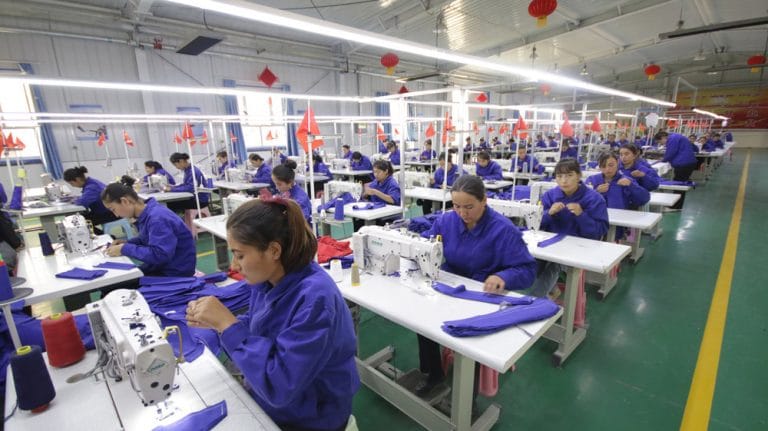Brands complicit in sourcing from China Uighur Muslims forced labour factories urged to stop

In November 2019, the China Cables—classified government papers that proved that the Xinjiang province in the West of China was home to detention and concentration camps holding an estimated one million Uighurs, Kazakhs and other Muslims—were leaked to The New York Times. In response, China continued to deny mistreatment and explained the camps were created to offer “vocational training and help fight terrorism and extremism.”
Now, more than 180 organisations are urging brands to end sourcing of cotton and clothing from Xinjiang and cut ties with Chinese suppliers that potentially benefit from the forced labour of the Uighurs and other Muslim groups. Which brands are (knowingly or unknowingly) benefiting from Xinjiang’s forced labour?
On Thursday 23 July, 72 Uyghur rights groups were joined by over 100 civil society organisations and labour unions from around the world decided last week to call out brands and retailers. Scott Nova, head of the US-based Worker Rights Consortium (WRC), who signed the letter that was sent, said: “Brands and retailers recognise there is a massive problem in the region, and that their supply chains are exposed to a grave risk of forced labour. We are cautiously optimistic that there will be commitments [from brands to pull out of Xinjiang] in the future.”
More than 80 per cent of China’s cotton comes from Xinjiang, which is home to about 11 million Uighurs. And while most fashion brands do not source from factories in Xinjiang, there are high chances that many of their supply chains are sourcing cotton picked by Uighurs detained in camps. This cotton is then exported across China and used by other suppliers.
On Thursday, a spokesperson for the Chinese embassy in London said that “the Chinese side has repeatedly responded to and rebuked false reports and accusations surrounding Xinjiang. The so-called ‘forced labour’ is just a concoction by some US and Western institutions and personnel. Nothing could be further from the truth.” But what did brands do to truly look into their supply chains?
In its press release, the WRC linked many important apparel brands and retailers to specific cases of Uyghur forced labour. Abercrombie & Fitch, adidas, Amazon, Gap, H&M, Muji, Nike, Patagonia, Zara and many other brands were named. Shortly after, the Thomson Reuters Foundation questioned more than 30 leading global retailers about their supply chains in China and the origins of the cotton they sourced.
Most of the brands did not respond directly to the questions, but said they had anti-forced labour policies and required their suppliers to comply with a code of conduct. Only one retailer declined to comment—Costco, based in the US.
Gap, Patagonia and Zara were included in the companies that responded. These said they did not source from factories in Xinjiang, but the majority could not confirm that their supply chain was free of cotton picked from the region.
Muji admitted it used cotton from Xinjiang but that independent auditors had found “no evidence of accusations of forced labour … at their mills.” PVH, which owns Calvin Klein and Tommy Hilfiger, said it would cut ties with any factories or mills that produce fabric or use cotton from Xinjiang within a year.
Less than two weeks ago, The New York Times revealed that some Chinese companies producing face masks for both domestic and export markets had used Uighur labour. Amid the growing diplomatic row between China and the US, will this new call to action be the last straw that breaks the camel’s back?




